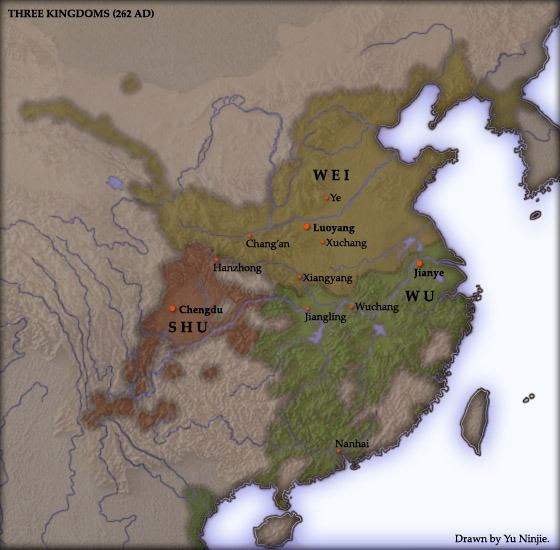- Eastern Wu
Infobox Former Country
native_name = aut|吳
conventional_long_name = Wu
common_name = Wu
national_motto =
continent = Asia
region = Pacific
country = China
era = Three Kingdoms
status = Empire
government_type = Monarchy
year_start = 222
year_end = 280
event_start = Establishment
event_end = Conquest of Wu by Jin
p1 = Han Dynasty
s1 = Jin Dynasty (265-420)
event1 =Sun Quan declares himself emperor
date_event1 = 229
event2 =
date_event2 =
event3 =
date_event3 =
event4 =
date_event4 =
event5 =
date_event5 =
image_map_caption = The territories of Eastern Wu (in green), AD 262
capital =Jianye
common_languages = Chinese
religion =Buddhism ,Taoism ,Confucianism ,Chinese folk religion
currency =Chinese coin ,Chinese cash
leader1 = Sun Quan
leader2 = Sun Liang
leader3 = Sun Xiu
leader4 = Sun Hao
year_leader1 = 229 - 252
year_leader2 = 252 - 258
year_leader3 = 258 - 264
year_leader4 = 264 - 280
title_leader = Emperor
legislature =
stat_year1 =
stat_area1 =
stat_pop1 = 2,300,000Eastern Wu (Chinese: 東吳;
pinyin : Dōng Wú), also known as Sun Wu (Traditional Chinese : 孫吳; pinyin: Sūn Wú), refers to a historical independent state in theJiangnan (Yangtze Delta) region ofChina . During its existence, its capital was largely atJianye (建業, modernNanjing ), but at times was at Wuchang (武昌, in modernEzhou ,Hubei ). From222 to280 , Eastern Wu was one of theThree Kingdoms competing for control ofChina after the fall of theHan Dynasty .History
During the decline of the Han dynasty, the region of Wu - a region in the south of the
Yangtze River surroundingNanjing - was under the control of the warlordSun Quan . Sun Quan succeeded his brotherSun Ce as the lord over the Wu region paying nominal allegiance toEmperor Xian of Han (who was, at that point, under the control ofCao Cao ). Unlike his competitors, he did not really have the ambition to be Emperor of China. However, afterCao Pi ofCao Wei andLiu Bei of theShu Han each declared themselves to be the Emperor, Sun Quan decided to follow suit in 229, claiming to have founded the "Wu Dynasty".Eastern Wu was finally conquered by the first Jin emperor,
Sima Yan , in 280. It was the longest-lived of the three kingdoms.Legacy
Under the rule of Eastern Wu, southern China, regarded in early history as a barbaric "jungle" developed into one of the commercial, cultural, and political centers of China. Within five centuries, during
the Five Dynasties and Ten States , the development of Southern China had surpassed that of the north. The achievements of Wu marked the beginning of the cultural and political division between Northern and Southern China that would repeatedly appear in Chinese history well into modernity.The
island of Taiwan may have been first reached by the Chinese during the Three Kingdoms period. Contacts with the native population and the dispatch of officials to an island named "Yizhou" (夷州) by the Eastern Wu navy might have been to Taiwan, but what Yizhou was is open to dispute; some historians believe it was Taiwan, while others believe it was theRyūkyū Islands .Important figures
*
Cheng Pu
*Chen Wu
*Ding Feng
*Dong Xi
* Empress Pan
*Empress Teng
*Empress Quan
* Empress Zhu
*Gan Ning
*Han Dang
*Huang Gai
*Jiang Qin
*Lady Wu
*Ling Cao
*Ling Tong
*Lu Kai
*Lu Kang
*Lu Su
* Lu Xun
*Lü Dai
*Lü Fan
*Lü Meng
*Pan Zhang
*Sun Ce
*Sun Deng
*Sun Hao
*Sun He
*Sun Jian
*Sun Jing
*Sun Jun
*Sun Kuang
*Sun Lang
*Sun Liang
*Sun Lin
*Sun Quan
*Sun Shao
*Sun Xiu
*Sun Yi
*Taishi Ci
*Wu Jing
*Xu Sheng
*Yu Fan
*Zhang Hong
*Zhang Zhao
*Zhou Tai
*Zhou Yu
*Zhuge Jin
*Zhuge Ke
*Zhu Ran
*Zhu Zhi
*Zu Mao List of sovereigns
Eastern Wu 222 -280 Posthumous Names ( Shi Hao 諡號)Personal names Year(s) of Reigns Era Names ( Nian Hao 年號) and their range of years"Convention: use personal name" Da Di (大帝 dà dì) Sun Quan (孫權 sūn quán)222 -252 Huangwu (黃武 huáng wǔ) 222 -229
Huanglong (黃龍 huáng lóng)229 -231
Jiahe (嘉禾 jiā hé)232 -238
Chiwu (赤烏 chì wū)238 -251
Taiyuan (太元 taì yuán)251 -252
Shenfeng (神鳳 shén2 fèng)252 Kuaiji Wang (會稽王 kuaì jī wáng) Sun Liang (孫亮 sūn liàng)252 -258 Jianxing (建興 jiàn xīng) 252 -253
Wufeng (五鳳 wǔ fèng)254 -256
Taiping (太平 taì píng)256 -258 Jing Di (景帝 jǐng dì) Sun Xiu (孫休 sūn xiū)258 -264 Yong'an (永安 yǒng ān) 258 -264 Wucheng Hou (烏程侯 wū chéng hóu)
or Guiming Hou (歸命侯; gūi mìng hóu)Sun Hao (孫皓 sūn haò)264 -280 Yuanxing (元興 yuán xīng) 264 -265
Ganlu (甘露 gān lù)265 -266
Baoding (寶鼎 baǒ dǐng)266 -269
Jianheng (建衡 jiàn héng)269 -271
Fenghuang (鳳凰 fèng huáng)272 -274
Tiance (天冊 tiān cè)275 -276
Tianxi (天璽 tiān xǐ)276
Tianji (天紀 tiān jì)277 -280 ee also
*
Shu Han
*Cao Wei
*Three Kingdoms
*Personages of the Three Kingdoms
*Timeline of the Three Kingdoms period
*"Romance of the Three Kingdoms "
*Records of Three Kingdoms
*"Dynasty Warriors "
Wikimedia Foundation. 2010.
